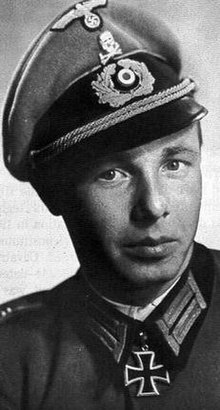Gerhard Boldt
| Gerhard Boldt | |
|---|---|
 |
|
| Born |
24 January 1918 Lübeck |
| Died | 10 May 1981 (aged 63) Lübeck |
| Allegiance |
|
| Service/branch | Army |
| Rank | Rittmeister der Reserve |
| Battles/wars | World War II |
| Awards | Knight's Cross of the Iron Cross |
Gerhard Boldt (24 January 1918 – 10 May 1981) was an officer in the German Army (Heer) who wrote about his experiences during World War II.
On 4 August 1943, Boldt was awarded a Knight's Cross of the Iron Cross for extreme bravery. He was a Senior-Lieutenant (Oberleutnant) with the 58th Infantry Division on the Eastern Front. Boldt also served as a cavalry officer.
During the last months of World War II, Boldt was seconded to Reinhard Gehlen's military intelligence staff. He was stationed in German dictator Adolf Hitler's Führerbunker. This was located below the Reich Chancellery in central Berlin. Boldt reported to General Hans Krebs and was summoned to a daily briefing session with Hitler, his generals, and closest associates - in particular Martin Bormann, Hermann Göring, and Joseph Goebbels. Boldt had a unique opportunity to observe at close quarters the leading members of the Nazi hierarchy during the Battle of Berlin. After the war, he wrote about his experiences during the last days in Nazi-held Berlin. Boldt's description of the atmosphere, first in the semi-ruined Reich Chancellery and then in the claustrophobic surroundings of the Führerbunker, convey a chilling impression of destruction and of the collapse of the entire Nazi system.
By 21 April 1945, Soviet Marshal Georgi Zhukov's 1st Belorussian Front had broken through the defenses of German General Gotthard Heinrici's Army Group Vistula on the Seelow Heights. Having achieved the breakthrough, the Soviets were advancing towards Berlin with little to stop them. Adolf Hitler, ignoring the facts, saw salvation in the ragtag units commanded by one of his favorite generals, Felix Steiner. Steiner's command became known as "Army Detachment Steiner" (Armeeabteilung Steiner). Unfortunately for the Germans, Army Detachment Steiner was an army which existed primarily on paper: it was something more than a corps but less than an army. Hitler ordered Steiner to attack the northern flank of the huge salient created by Zhukov's breakthrough; and the German Ninth Army, commanded by General Theodor Busse, which had been pushed to the south of the salient, was ordered to attack northward in a pincer attack.
...
Wikipedia
